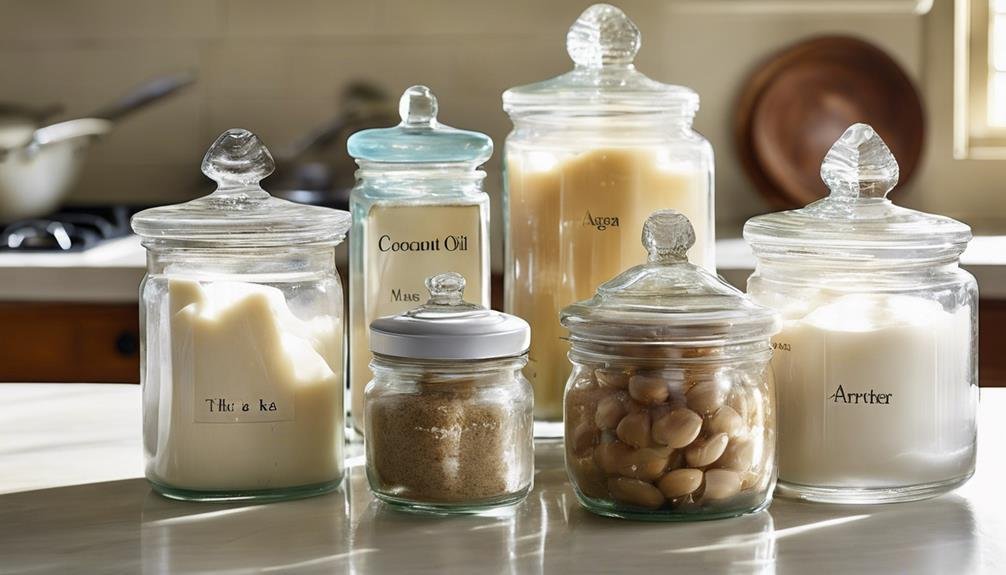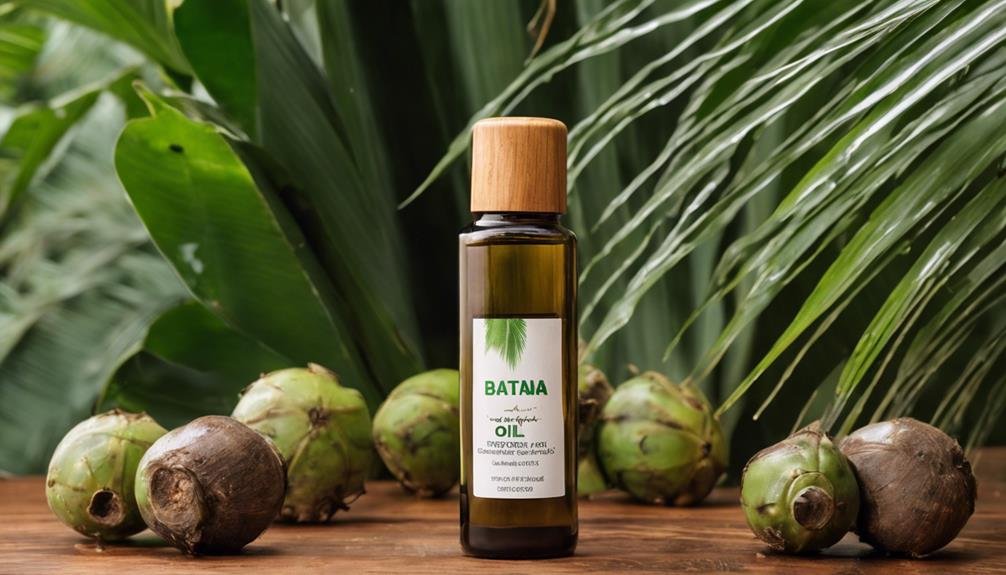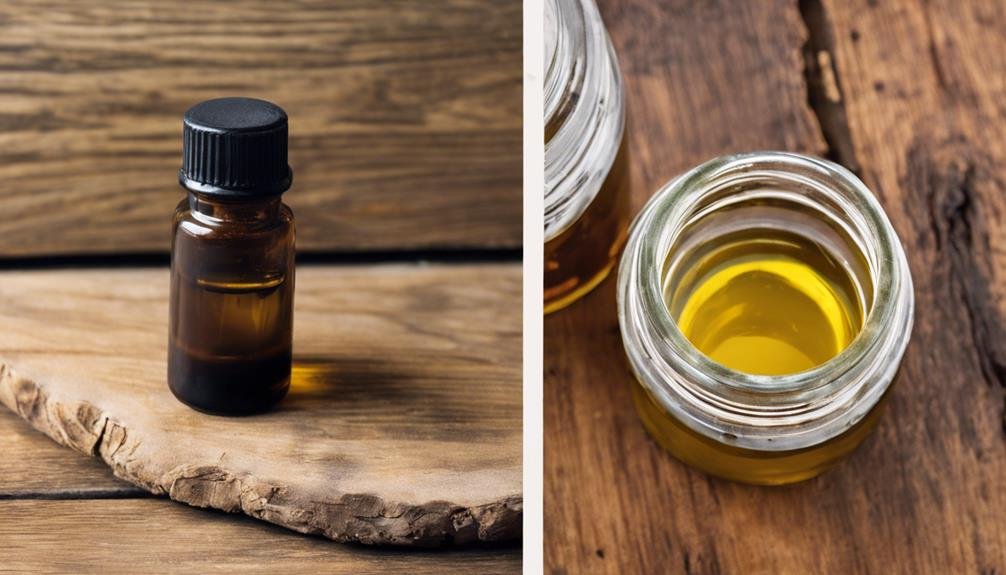You've just discovered your bottle of raw batana oil has gone bad, marked by its unpleasant smell and changed texture. You might wonder if there's any safe way to use it or if you should discard it immediately. While spoiled oils are generally advised against for direct skin or hair application due to increased risks of irritation or infection, consider whether there might be less obvious, safer applications for this oil. Before deciding to throw it away, let's explore some potential uses that could salvage its value without compromising your health. What could these alternatives be, and are they worth considering?
Key Takeaways
- Spoiled batana oil should not be used on skin due to risks of irritation and microbial growth.
- Repurpose spoiled oil for making homemade candles or soaps to avoid waste.
- Utilize expired batana oil in eco-friendly DIY projects like furniture polish or body scrubs.
- Conduct a patch test before any alternative use to ensure it doesn't cause skin reactions.
- Safely dispose of thoroughly spoiled oil to prevent environmental pollution and health hazards.
Identifying Spoiled Batana Oil
When checking your batana oil, first notice if it smells off; a rancid or foul odor typically means it's spoiled. This foul smell is a clear sign of oxidation, where the oil's essential fats break down, altering its quality and efficacy.
If you're still uncertain, look for other telltale signs of spoilage. Discoloration is another red flag. If your batana oil has darkened or appears cloudy compared to its usual golden hue, it's likely contaminated. This change can indicate exposure to light or heat, both of which can accelerate spoilage.
Additionally, check the texture of the oil. If it feels gritty or slimy, this inconsistency suggests that the oil's natural composition has been compromised, likely due to microbial growth or other contamination.
Lastly, be on the lookout for sediment or particles settling at the bottom of the container. This sediment can harbor bacteria or fungi, posing a risk of skin irritation or other adverse reactions.
Always remember, using spoiled batana oil isn't worth the risk to your skin's health. It's best to discard any oil that shows these signs of spoilage to avoid potential harm. Remember that spoiled batana oil can cause irritation, rashes, and other skin issues. To prevent this, make sure to store your batana oil in a cool, dark place and always keep it tightly sealed. Following proper batana oil storage tips is key to maintaining its quality and ensuring that it remains safe for use on your skin.
Health Risks of Spoiled Oil
Using spoiled raw batana oil poses significant health risks. When this oil spoils, it undergoes chemical changes that not only diminish its therapeutic qualities but also increase the formation of harmful peroxides and free radicals. These substances can cause skin irritation or even severe adverse reactions such as dermatitis. If you notice any discomfort or signs of irritation, it's vital to stop using the oil immediately.
Moreover, the breakdown of organic compounds in expired batana oil can lead to microbial growth. This is particularly risky if you have sensitive skin, as the microbes can exacerbate health risks, triggering allergic reactions or further skin complications.
Always be wary of any foul odors or discoloration, as these are clear indicators that the oil should no longer be used on your skin or hair.
To minimize risks, consider conducting a patch test before applying any expired oil more broadly. Apply a small amount to a discreet area of your skin and wait to see how your body reacts. This simple precaution can help you avoid more serious health issues that might arise from using spoiled raw batana oil.
Effective Uses for Expired Oil

As you explore repurposing expired Batana oil, it's essential you adhere to safety precautions to avoid skin irritations or allergic reactions.
Consider alternative applications like using it in homemade candles or soaps, which can help mitigate environmental waste while still utilizing the oil's properties.
Always weigh the environmental considerations; proper disposal methods guarantee you're not harming the ecosystem while finding new uses for your expired oil.
Safety Precautions
Despite its expiration, batana oil retains moisturizing qualities that make it useful for less significant tasks, such as crafting body scrubs or foot creams.
However, it's essential to take certain safety precautions to avoid any adverse reactions. Before you start slathering it all over, conduct a patch test. Apply a small amount of the expired batana oil to a discreet area of your skin and wait to see if there's any negative response. This simple step can save you from potential discomfort or more serious skin issues.
Furthermore, keep your expired batana oil in a tightly sealed container and store it in a cool, dark place. Exposure to heat or light can accelerate spoilage, potentially increasing the risk of irritation when used.
Be especially wary if you notice changes in smell, texture, or color, as these can be signs that the oil has gone bad.
Alternative Applications
Repurposing expired raw batana oil into homemade body scrubs not only extends its usefulness but also leverages its inherent moisturizing properties. By mixing it with ingredients like sugar or salt, you'll create a scrub that's effective in hydration and gentle on your skin.
It's a fantastic way to guarantee nothing goes to waste while keeping your skin smooth.
You can also whip up DIY foot creams using expired batana oil. It's perfect for restoring nourishment and hydration to dry, cracked heels. Blend the oil with shea butter and essential oils for a soothing, natural treatment that'll make your feet feel wonderfully soft.
Consider making natural candles with expired batana oil as well. It acts as a superb base that enhances the scent and improves the texture of the candles.
Plus, you'll appreciate the ambient glow knowing you've creatively recycled the oil.
For your hair, try crafting hair masks. Even though the oil's potency may decline, it still offers beneficial properties that can help maintain hair's luster and health.
Lastly, don't overlook non-cosmetic applications like furniture polishing. Expired batana oil can give your wooden furnishings a new lease on life, adding shine and protection without harsh chemicals.
Environmental Considerations
Effective management of expired batana oil not only reduces waste but also safeguards our environment. You can play an important role in this, and here's how your actions matter:
- Repurposing for Non-Cosmetic Uses: Transform expired batana oil into homemade candles or soaps. This not only extends the oil's life but also taps into your creative side, turning a potential waste product into something useful and delightful.
- Community Initiatives: Engage in or start community programs that focus on the proper disposal and repurposing of expired oils. These initiatives raise environmental awareness and foster eco-friendly practices within your neighborhood, making sustainability a shared goal.
- Supporting Lower-Quality Cosmetic Productions: Utilize expired batana oil in the creation of lower-quality cosmetic products such as body scrubs and foot creams. This approach helps small businesses cut costs while promoting sustainability, proving that expired doesn't mean useless.
Storage Tips to Prevent Spoilage
To prevent your batana oil from spoiling, store it in a cool, dark place. This minimizes exposure to heat and light, both of which can speed up the oxidation process, leading to spoilage.
Make certain you're using airtight containers to limit the oil's contact with air. Oxygen can turn your precious oil rancid and degrade its beneficial properties.
You'll also want to avoid humidity. Moist environments can encourage microbial growth, so opt for a dry storage area to keep your batana oil safe.
Consider transferring the oil into smaller bottles for daily use. This reduces the amount of air that interacts with the oil each time you open it, keeping it fresher for longer.
Lastly, keep an eye on spoilage indicators such as changes in smell, color, or texture. If you notice any of these signs, it's best to discard the oil to guarantee safety.
Regular checks will help you catch any issues early and prevent you from using oil that could compromise your health. By following these storage tips, you'll maximize the lifespan of your batana oil and enjoy its benefits safely.
Alternatives to Spoiled Batana Oil

When your Batana oil spoils, you're better off using fresh oil to guarantee you're getting all those essential fatty acids and antioxidants your hair loves.
If you're stuck with spoiled oil, it's safest to dispose of it properly rather than risking damage to your skin or hair.
You can explore other natural oils like coconut or jojoba, which offer similar benefits without the quick spoilage.
Fresh Oil Benefits
Despite the drawbacks of spoiled batana oil, fresh batana oil provides essential fatty acids and antioxidants that are essential for maintaining healthy hair and scalp.
Using fresh batana oil, you'll experience the richness of its ingredients, which are significant for your hair's health and appearance.
Here's what you can expect:
- Enhanced Hair Health: Fresh batana oil is packed with vitamin E and essential fatty acids that offer antioxidant protection. This not only helps in promoting healthy hair growth but also prevents damage from environmental stressors.
- Improved Hair Texture: The light texture and superior absorption of fresh batana oil guarantee that it penetrates deep into the hair shaft. This helps to repair and strengthen your hair, giving it a smoother and shinier appearance.
- No Adverse Reactions: Unlike spoiled oil, which can cause irritation or other negative reactions, fresh batana oil is safe and effective.
You won't have to worry about any adverse effects, as its natural composition is gentle on your scalp and hair.
Safe Disposal Methods
If you've discovered your batana oil has spoiled, it's crucial to dispose of it responsibly to prevent environmental harm and plumbing issues. Never pour it down the drain, as this can lead to considerable plumbing problems and contribute to environmental pollution.
Instead, consider repurposing your spoiled batana oil. It can be creatively used in making homemade candles or even soaps. This not only prevents waste but also utilizes the oil's natural properties in a beneficial way.
Another safe disposal method is to seal the spoiled oil in a container and dispose of it in the trash. This prevents any risk of leakage into the environment.
Additionally, check if there are community programs in your area dedicated to the disposal of cosmetic oils. These programs guarantee spoiled oils are handled in a way that mitigates environmental risks.
To avoid future spoilage and reduce the need for disposal, store batana oil properly. Keep it in a cool, dark place and consider using smaller bottles to limit air exposure once opened.
These storage tips can greatly extend the life of your cosmetic oils and reduce the frequency of disposal.
Environmental Considerations
The improper disposal of spoiled raw batana oil poses serious environmental risks, as the organic compounds within it may generate methane in landfills, a potent greenhouse gas.
When you toss out expired oils, you're not just clearing space in your bathroom; you're potentially contributing to environmental pollution. But don't despair—there are sustainable ways to manage this issue.
Initially, consider community programs focused on the proper disposal of such products. These initiatives not only mitigate risks but also promote sustainability by ensuring expired oils don't end up in landfills.
Furthermore, repurposing raw batana oil for non-cosmetic uses, like making candles or soaps, can greatly extend its lifespan and reduce waste.
Finally, there's power in your purchase decisions. Supporting brands that are committed to ethical sourcing and sustainable practices can diminish the overall environmental footprint of beauty products.
Here's how you can help:
- Educate yourself about the environmental impact of improper disposal and share this knowledge.
- Participate in or initiate community disposal programs.
- Opt for products from companies that prioritize sustainability.
Purchasing High-Quality Batana Oil

When you're in the market for batana oil, choosing a high-quality product is important. You'll want to start by selecting batana oil from reputable sellers or trusted brands. This step guarantees the authenticity of the oil, which is significant for avoiding skin irritation and guaranteeing effectiveness.
Always check for an expiration date on the packaging. Using expired oil not only diminishes its benefits but could also harm your skin.
It's also essential to inspect the packaging for any signs of damage. Compromised packaging can mean the oil has been exposed to air and light, which can lead to spoilage.
To further safeguard the oil's integrity, opt for batana oil in dark-colored bottles. These bottles help protect the oil from light, preventing the acceleration of degradation.
Don't forget to read customer reviews before making your purchase. These reviews can provide insights into the oil's performance and share experiences from other users, helping you make a well-informed decision.
Frequently Asked Questions
Can Batana Oil Go Bad?
Yes, batana oil can certainly go bad.
To extend its shelf life, store it properly in a cool, dark place, and keep it sealed tightly.
Watch for signs of spoilage like a rancid smell or discoloration.
Using spoiled oil can affect its benefits and might harm your skin or hair.
Always source fresh batana oil to guarantee you're getting its full benefits.
Why Does Batana Oil Stink?
You're noticing that batana oil stinks due to several factors.
The natural scents change when the fermentation process kicks in, often resulting from poor storage conditions. Additionally, the quality of the oil can diminish if the extraction methods or ingredient sourcing aren't up to par.
Aroma differences are clear indicators of these issues. To guarantee your oil maintains a pleasant smell, check that it's stored properly and sourced from reputable suppliers.
What Happens if You Don't Wash Out Batana Oil?
If you don't wash out batana oil, it can clog your follicles and hinder hair growth.
Over time, the oil's high-fat content may disrupt your scalp's sebum balance, causing dryness or greasiness. This buildup reduces hair's natural shine and can even lead to an unpleasant odor as the oil oxidizes.
To maximize hair nourishment and scalp health, use the oil sparingly, apply with proper techniques, and verify it's thoroughly washed out.
Why Is My Batana Oil Green?
Your batana oil's green color is normal and indicates its purity and freshness.
This hue results from chlorophyll in the palm fruit, reflecting careful sourcing and gentle processing. Quality extraction methods preserve these colors and nutrients, enhancing the oil's benefits.
Proper storage can maintain this quality, but always check for signs of spoilage.
Green batana oil generally signals good shelf life and variety, assuming it's from a reputable producer.
Conclusion
To conclude, you're better off avoiding spoiled batana oil due to the health risks it presents. If you detect any signs of spoilage, it's safest to dispose of it responsibly. Instead, focus on storing your oil correctly to prevent spoilage and always opt for high-quality batana oil. Remember, using fresh oil guarantees you reap the full benefits for your skin and hair, keeping you both safe and radiant. Choose wisely and take care of your health!

